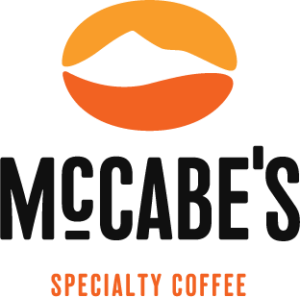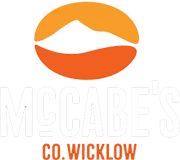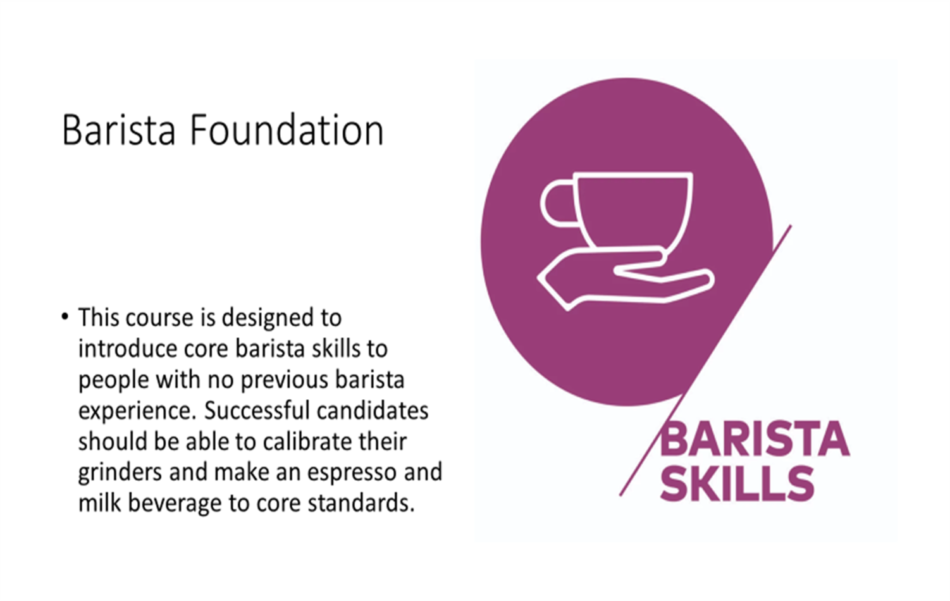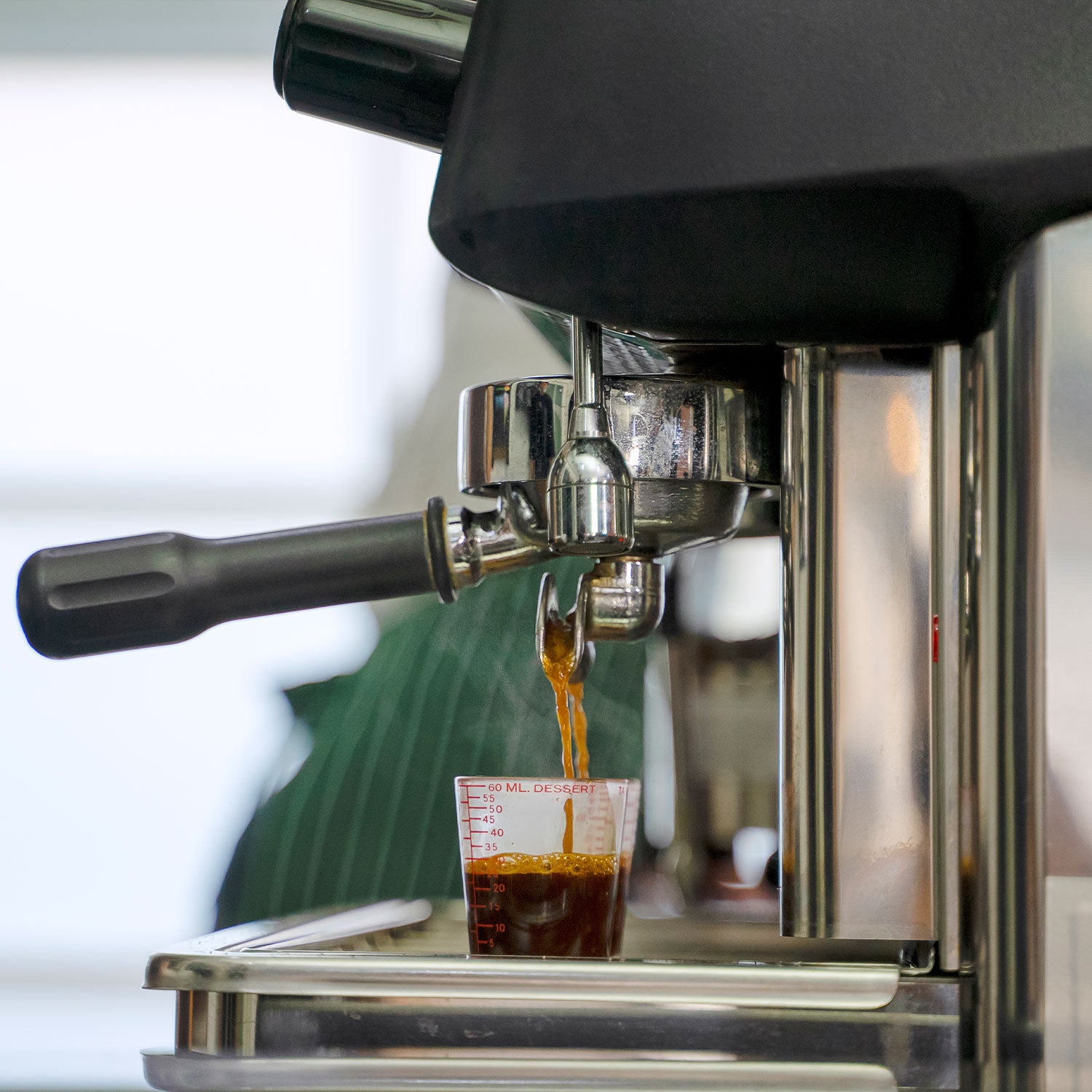
Barista Training
We are proud to say the first Barista School in Co. Wicklow was established at our roastery in NewtownMountKennedy in 2015. Since our humble beginnings, we have seen how important training has become and how important it is to be delivering the highest standards each time.
McCabe's Coffee offers meticulously crafted Barista and Café Skills courses for all aspiring coffee enthusiasts in Wicklow and neighbouring counties - Dublin, Wexford, Carlow, and Kildare.
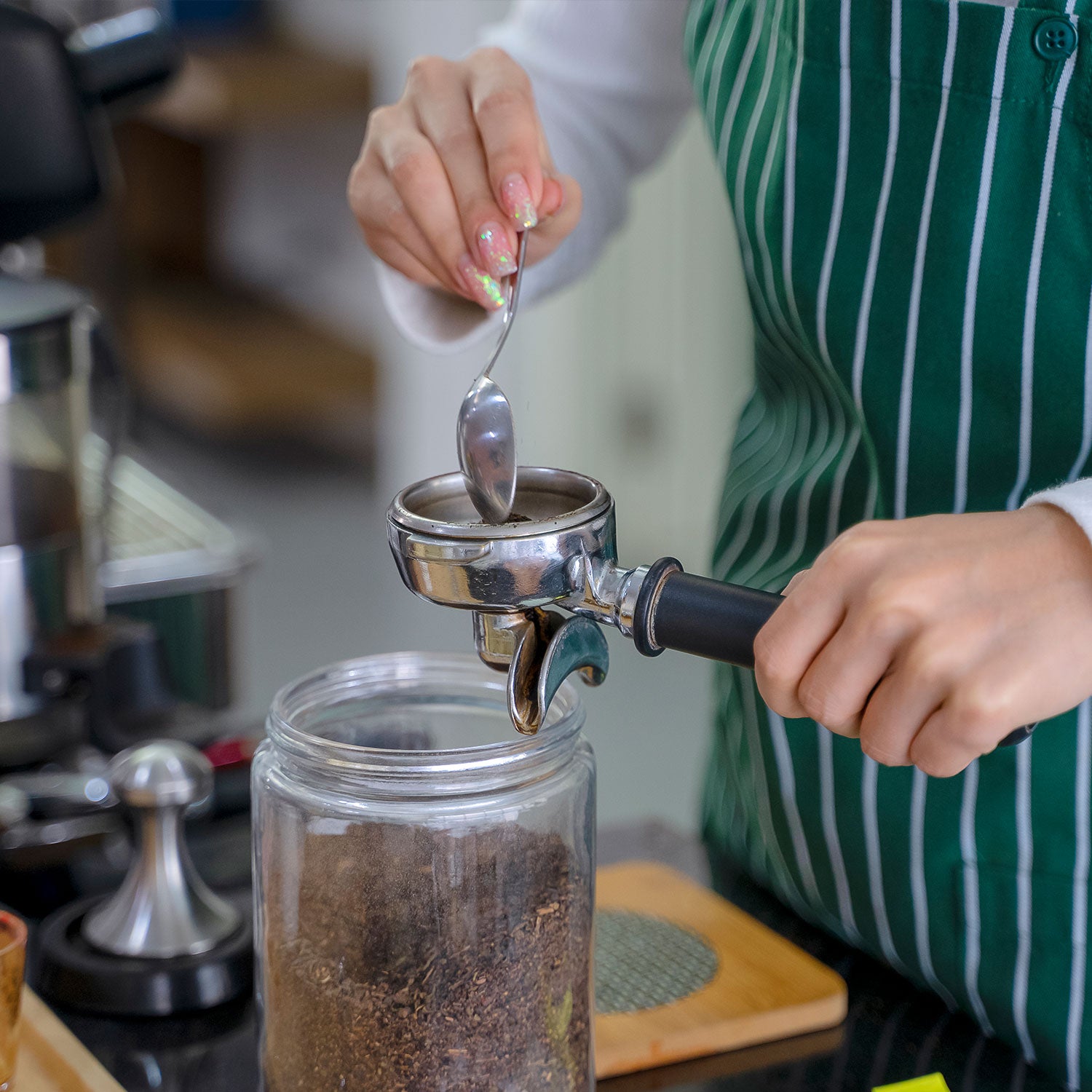
McCabe’s Barista Courses in Co. Wicklow
We offer hands on courses, Coffee Brewing and Latte Art classes perfect for home baristas and coffee enthusiasts who want to improve their barista skills.
If you have any questions please email our Head Trainer Renata at renata@mccabecoffee.com .
More about McCabe's Coffee Barista Courses
McCabe's Coffee, located in Co. Wicklow, Ireland, offers a wide range of barista training courses for coffee enthusiasts. Whether you’re a beginner or an experienced barista looking to improve your skills, McCabe's Coffee has the perfect training program for you. The barista training course covers everything from coffee brewing techniques to latte art and customer service, ensuring that graduates are well-equipped to work in any coffee shop.
If you’re looking for a barista course or program in Dublin or Kildare, McCabe's Coffee is a perfect choice as we are within driving distance. Our coffee training program is well-respected in Ireland, and the instructors are highly experienced and knowledgeable.
Barista Courses
McCabe's Coffee - Barista Course FAQs
Introduction to Barista Profession
What is a barista?
A barista is a person who is trained in the art of making and serving coffee. They work in coffee shops, cafes, or restaurants and are responsible for preparing espresso-based drinks such as lattes, cappuccinos, and macchiatos. They also often handle the grinding and brewing of coffee beans, as well as the presentation and serving of the beverages to customers. Baristas are knowledgeable about different coffee beans, brewing methods, and flavour profiles, and they may also have expertise in latte art.
We would refer you to the Wiki definition of a Barista for more information
Do I need any formal education to become a barista?
No, you do not necessarily need formal education to become a barista. While some coffee shops or employers may prefer candidates with previous experience or training, many entry-level barista positions provide on-the-job training. However, there are also professional barista courses and certifications available that can enhance your knowledge and skills in coffee preparation and service. These courses can cover topics such as espresso extraction, milk steaming, latte art, coffee tasting, and customer service. Ultimately, the level of education or training required may vary depending on the specific coffee shop or employer.
Is it necessary to have prior experience in the food and beverage industry to become a barista?
No, it is not necessary to have prior experience in the food and beverage industry to become a barista. While experience in the industry can certainly be beneficial and may give you an advantage when applying for barista positions, many coffee shops and cafes are willing to provide on-the-job training for individuals with little to no experience. The most important qualities for a barista are a passion for coffee, a willingness to learn, attention to detail, and good customer service skills. If you are enthusiastic about coffee and willing to learn, you can start as a beginner and gain experience and expertise as you work in the role.
How to know if Barista as a profession is for me?
To determine if the barista profession is a good fit for you, consider the following:
1. Passion for coffee: Do you have a genuine interest in coffee and its various flavours, origins, and brewing methods? Are you excited about learning and experimenting with different coffee beverages?
2. Customer service skills: Baristas interact with customers daily, so it's important to enjoy working with people, providing excellent service, and creating a positive experience for customers.
3. Attention to detail: Baristas need to pay close attention to the details of coffee preparation, such as measuring ingredients, timing espresso shots, and ensuring consistency in taste and presentation.
4. Ability to handle pressure: Coffee shops can be fast-paced environments, especially during peak hours. Can you handle working efficiently and calmly under pressure?
5. Interest in learning and improving: The coffee industry is constantly evolving, with new brewing methods, equipment, and trends emerging. Are you willing to continually learn and improve your skills as a barista?
If you find yourself aligning with these qualities and enjoy the idea of working with coffee and serving customers, then the barista profession may be a good fit for you.
What skills do I need to master to become a pro barista?
To become a professional barista, you should aim to master the following skills:
1. Espresso preparation.
2. Milk steaming and texturing
3. Latte art like heart, rosetta, tulips. This adds a visual appeal to the beverage.
4. Coffee knowledge: Deepen your understanding of coffee origins, flavour profiles, brewing methods, and different types of coffee beans. This knowledge will allow you to educate customers and make informed recommendations.
5. Customer service: Develop excellent customer service skills, including active listening, effective communication, and the ability to provide personalized recommendations based on customer preferences.
6. Time management: Learn to work efficiently and manage your time effectively, especially during busy periods.
7. Equipment maintenance.
8. Adaptability and flexibility: Be adaptable to different customer preferences and requests, as well as changing coffee trends and techniques. Stay open to learning new skills and experimenting with different coffee recipes.
Remember, mastering these skills takes practice, dedication, and continuous learning. Consider taking professional barista courses or seeking mentorship from experienced baristas to further develop your skills and knowledge in the field.
Are there any health and safety considerations for working as a barista?
Yes, there are several health and safety considerations to keep in mind when working as a barista. Some important ones include:
1. Proper ergonomics: Baristas often spend long hours on their feet, performing repetitive tasks. It's important to maintain good posture, take breaks when needed, and use proper lifting techniques to avoid strain or injury.
2. Burns and scalds: Baristas work with hot equipment and liquids, so it's crucial to be cautious and use protective equipment. Take care when handling hot cups, steam wands, and espresso machines.
3. Slips, trips, and falls: Coffee shops can be busy and crowded environments. Be mindful of spills, wet floors, and cluttered areas to prevent accidents. Clean up spills promptly and ensure clear pathways for both staff and customers.
4. Allergen awareness: Be aware of common allergens, such as nuts or dairy, and take precautions to prevent cross-contamination. Properly clean equipment and utensils after each use to avoid allergen transfer.
5. Food safety and hygiene: Follow proper food handling and hygiene practices to prevent foodborne illnesses. This includes regular handwashing, wearing gloves when necessary, and storing and preparing food at appropriate temperatures.
6. Chemical safety: Baristas may work with cleaning agents and chemicals for equipment maintenance. Follow safety protocols, wear appropriate protective gear, and ensure proper ventilation when using these substances.
It's crucial to receive proper training on health and safety protocols from your employer and stay updated on any changes or new guidelines. By being mindful of these considerations, you can create a safe and healthy work environment for yourself and your customers.
Barista Course Details
When do the Barista courses start?
To find out about the start dates of barista courses, it would be best to directly contact our Head Trainer Renata by sending email to renata@mccabe.com. She will be able to provide you with the most up-to-date information and guide you on how to book a course.
What is the most popular course for beginners and those looking to gain some experience?
The most popular barista course for beginners and those looking to gain some experience is the "SCA Barista Skills Foundation" or "Introduction to Coffee" course.
This course is designed to provide a solid foundation in coffee-making skills and knowledge. It covers topics such as espresso extraction, milk steaming, basic latte art, coffee bean origins, and customer service.
The popularity of this course can be attributed to the fact that it is suitable for individuals with no prior barista experience
Some additional courses that may be popular for those looking to gain more experience in the field of barista include:
1. SCA Barista Skills Intermediate. This course builds upon the basics and focuses on refining techniques, understanding different recipes, other factors influencing taste and quality of espresso produced and exploring more advanced latte art designs.
2. SCA Sensory Skills Course: This course is designed to enhance sensory skills and develop the ability to identify different flavours, aromas, and characteristics of coffee.
What's the difference between a barista course and a barista certification program, and which one should I consider?
A barista course and a barista certification program are two different offerings related to barista training. Here's a breakdown of their differences:
1. Barista Course: A barista course is a training program designed to teach individuals the fundamental skills and knowledge required to work as a barista. These courses typically cover topics such as espresso extraction, milk steaming, latte art, coffee bean origins, and customer service.
2.SCA Barista Certification Program: A barista certification program is a more comprehensive and in-depth training program that goes beyond the basics covered in a barista course. Certification programs typically involve both theoretical and practical assessments, including written exams and hands-on performance evaluations. They may also require a certain number of hours of practical experience.
Which one you should consider depends on your goals and aspirations in the field of barista work. If you are looking to gain basic skills and knowledge to start working as a barista, a barista course may be sufficient. However, if you are aiming for professional development, career advancement, or seeking recognition in the industry, a barista certification program may be more suitable. Certification programs can provide you with a formal credential that may be valued by employers and can enhance your job prospects.
How long does a typical barista course or certification program last, and what topics are covered in the curriculum?
The duration of a barista course or certification program can vary depending on the specific program and the depth of training provided.
Barista Course can range from a few hours to one full day, depending on the intensity and depth of training. Topics covered :
- Understanding espresso extraction, grind size, dosing, tamping, and brewing techniques.
- Techniques for steaming milk to achieve the right texture and temperature, as well as basic latte art designs.
- Learning about different coffee beverages, their ingredients, and preparation methods.
- Developing skills in customer interaction, communication, and providing excellent service.
Barista Certification Program:
- A barista certification program can take a few days depending on the program and the level of certification.
- The curriculum of a barista certification program typically includes the topics covered in a barista course, but in greater depth and with additional areas of focus. In addition to the basics, a certification program may cover:
1.Advanced espresso extraction, troubleshooting, dialing in, and achieving consistency.
2. Coffee Cupping and Tasting: Developing sensory skills to identify flavours, aromas, and characteristics of different coffees.
4. Coffee Business Management: Introduction to coffee shop operations, inventory management, cost control, and menu development.
What should I expect during the hands-on training portion of a barista course, and how can I practice these skills at home?
During the hands-on training portion of a barista course, you can expect to practice and develop your skills in various aspects of coffee preparation and service. Here are some common elements of hands-on training in a barista course:
1. You will learn how to operate an espresso machine, adjust grind size, dose, and tamp coffee grounds, and extract espresso shots. You will practice achieving the right extraction time, volume, and taste.
2. Milk Steaming and Latte Art: You will learn the techniques for steaming milk to achieve the desired texture and temperature. You will practice pouring latte art designs such as hearts, tulips, and rosettas.
4. Equipment Maintenance: You will learn how to clean and maintain espresso machines, grinders, and other equipment. This includes backflushing, descaling, and routine cleaning procedures.
5. Workflow and Efficiency: You will practice the workflow and organization of a barista station to ensure smooth operations during busy periods. This includes managing multiple drink orders, time management, and maintaining cleanliness.
To practice these skills at home, there are a few things you can do:
1. Invest in Basic Equipment: Consider purchasing a home espresso machine and grinder. This allows you to replicate the techniques and recipes learned during the course.
2. Experiment with Different Coffees: Purchase a variety of coffee beans from different regions and experiment with different roast levels. This will help you develop your palate and understand the flavour profiles of different coffees.
3. Watch Online Tutorials: There are many online resources, videos, and tutorials available that can provide guidance and tips on barista techniques. Watching and practicing along with these resources can help you refine your skills.
Remember, practice and repetition are key to improving your barista skills. Be patient and persistent in honing your techniques and seek feedback from experienced baristas or coffee enthusiasts to further enhance your skills.
Does the barista course cover customer service and communication skills in addition to coffee preparation techniques?
Yes, many barista courses do cover customer service and communication skills in addition to coffee preparation techniques.
Customer service is an essential aspect of being a successful barista, as it involves interacting with customers, understanding their preferences, and providing a positive experience.
Barista courses often emphasize the importance of greeting customers, actively listening to their orders, and engaging in friendly and professional conversations. This includes understanding customer preferences, dietary restrictions, and offering suitable recommendations.
Baristas are expected to have a good understanding of the coffee menu, including the different types of coffee beverages, their ingredients, and preparation methods.
What types of coffee machines and equipment will I learn to use on this baristas course?
The specific types of coffee machines and equipment you will learn to use in a barista course can vary depending on the course provider and the curriculum. However, here are some common types of coffee machines and equipment that are typically covered in a barista course:
1. Espresso machines are a fundamental part of barista training. You will learn how to operate and work with different types of espresso machines. This includes understanding the machine's components, adjusting settings, and extracting espresso shots.
2. Coffee grinders are essential for grinding coffee beans to the appropriate size for espresso or other brewing methods. You will learn how to use and adjust coffee grinders to achieve the desired grind size and consistency for optimal extraction.
3. Milk steamer is used to create the creamy and velvety texture for milk-based drinks like lattes and cappuccinos. You will learn how to steam milk to achieve the right temperature and texture, as well as techniques for latte art.
5. Precision is crucial in coffee preparation. You will learn how to use coffee scales and timers to measure and time the extraction process accurately, ensuring consistency in your coffee-making.
6. Proper cleaning and maintenance of coffee machines and equipment are essential for ensuring hygiene and longevity. You will learn about the cleaning procedures and tools required to keep the equipment in good working condition.
What are the different types of coffees I would learn to make after a barista course?
After completing a barista course, you can expect to learn how to make a variety of different coffee beverages.
1. Espresso is the foundation for many coffee beverages. You will learn how to extract a proper shot of espresso.
2. An Americano is made by adding hot water to a shot of espresso.
3. A Cappuccino consists of equal parts espresso, steamed milk, and milk foam.
4. A Latte is made with a shot of espresso and steamed milk, with a small amount of foam on top.
5. A flat white is like a latte but with less milk and foam and a stronger espresso flavour.
6. A Macchiato is an espresso shot with a small amount of milk foam on top.
7. A Mocha is a combination of espresso, chocolate, steamed milk, and sometimes whipped cream.
8. Pour-Over Coffee: In addition to espresso-based beverages, you may also learn how to make pour-over coffee using methods such as V60, Chemex, or Kalita Wave. This involves pouring hot water over coffee grounds in a controlled manner to extract flavours.
Barista Course Payments and Cancellations
How much does it typically cost to enroll in a barista course?
Depending on type of training prices start from 145EUR per person.
Do I pay in full or installments for the Barista course?
McCabe’s Coffee offers the option to pay in full upfront.
Do you have a Barista Course Gift Voucher?
McCabe’s Coffee offer gift vouchers that can be purchased and given as a gift to someone interested in taking a barista course.If you are interested in purchasing a barista course gift voucher, reach out to renata@mccabecoffee.com She will be able to provide you with more information on how to purchase a gift voucher and any specific details regarding courses.
I am unable to attend the course I booked, what do I do?
Reach out McCabe’s Coffee directly to inform them of your situation and explain that you are unable to attend the course. Provide them with as much notice as possible to allow them to make any necessary arrangements.
There is an option to reschedule your course for a later date.
How do I apply for the barista course?
To apply for the barista training first you need to go to our website Barista Training Page book training you are interested in and our Head of Training will contact you to arrange the date.
Do you offer group discounts for Barista courses?
Yes we offer discounted price on group sessions. Write to us about your request via the contact us page or Call us on 01-4370877
Barista Career Aspects
What are the career opportunities after completing a Barista Course?
After completing a Barista Course, there are several career opportunities available.
1. The most obvious career choice is to work as a barista in a coffee shop, café, or restaurant. As a barista, you will be responsible for preparing and serving coffee and other beverages to customers.
2. With experience and additional training, you can advance to the position of a coffee shop manager. In this role, you will oversee the daily operations of a coffee shop, including managing staff, ordering supplies, creating menus, and ensuring customer satisfaction.
3. Another career option is to become a coffee roaster. This involves sourcing and selecting coffee beans, roasting them to perfection, and creating unique blends.
4. If you have a passion for teaching and sharing your knowledge, you can become a coffee educator. In this role, you can conduct workshops, training sessions, and classes to educate others about coffee brewing techniques, latte art, and coffee appreciation.
5. As a coffee consultant, you can provide expert advice and guidance to coffee shops, restaurants, or businesses looking to improve their coffee offerings.
6. If you have strong writing skills and a passion for coffee, you can pursue a career as a coffee writer or blogger. You can write articles, reviews, and guides about coffee, share your experiences, and provide recommendations to coffee enthusiasts.
7. Another career option is to work in sales for coffee equipment manufacturers or distributors. This role involves selling coffee machines, grinders, and other equipment to coffee shops, restaurants, and businesses.
These are just a few examples of the career opportunities available after completing a Barista Course. The coffee industry offers a wide range of roles, allowing you to explore different paths based on your interests and skills.
